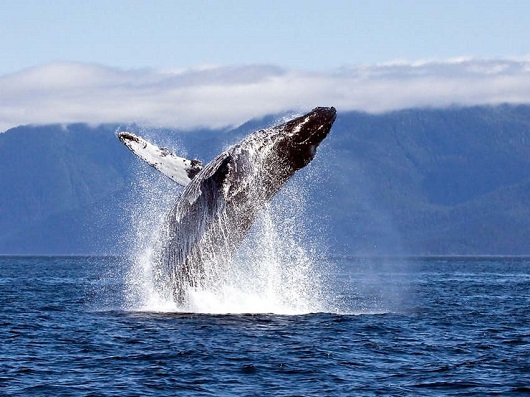Marine scientists win over £190,000 funding

Groundbreaking research into killer whale calls and ocean noise pollution has led to scientists at the University of St Andrews being awarded prestigious fellowships in marine conservation.
Dr Olga Filatova and Dr Rob Williams have each been awarded a $150,000 (£97,000) 2015 Pew Fellowship to build on their research at the Sea Mammal Research Unit (SMRU).
Dr Filatova will use her funding award to pioneer research into the diversity and habitats of marine life in Russian waters – including orcas, humpback, Baird’s beaked, North Pacific right and sperm whales. Her conclusions will have strong implications for the protection of these species.
With the support of his Pew Fellowship, Dr Williams will be able to provide advice on the increasing levels of noise pollution experienced by marine mammals, developing the evidence to allow policy-makers to address conservation risks.
Dr Filatova and Dr Williams are among only five distinguished scientists and conservationists from around the world to be honoured as this year’s Pew Fellowship recipients.
Dr Williams said: “It was an honour to be nominated; to be among the five Fellows considered to be doing the most innovative work in marine conservation is great.
“Added to that, the fact that two of the recipients conducted research at the University of St Andrews, speaks volumes about the SMRU and the University’s standing within the global marine conservation community.”
Current Marie Curie Fellow, Dr Filatova from Russia has been researching the evolution of sounds in orca whales at the SMRU – one of the world’s foremost research institutions and part of the Scottish Oceans Institute at the University of St Andrews.
Dr Williams, who is Canadian, earned his PhD from the University of St. Andrews in 2003. He resumed his research at the University in 2010 when he was awarded a Marie Curie Fellowship to continue his work on marine mammal conservation and management, with a special emphasis on the impact of ocean noise on mammals.
During their three-year Pew Fellowships, both scientists aim to gain greater understanding of the challenges faced by marine mammals in their habitats and propose scientifically-based solutions that meet conservation criteria.
Dr Filatova said: “Working at St Andrews has been an incredible experience. The initial focus of my work here was the cultural evolution of killer whale vocalisations, but meeting other marine scientists and listening to various talks and discussions inspired me to broaden the scope of my research.
“Whales in the Russian Pacific are increasingly threatened by industrial activities, severe overfishing and the hunting and live capture of smaller species such as beluga and orca whales. Improving the protection of their habitat is essential to their survival. Through my Pew Fellowship, I plan to identify critical habitats in order to define, justify and propose marine protected area networks for cetaceans.”
Dr Williams intends to use his Pew Fellowship to provide evidence-based advice on acceptable ocean noise limits and help establish quieter marine protected areas.
Dr Williams continued:
“Many marine species communicate using sound, which transmits well through water. However, maritime activities have caused ocean noise levels to double every decade for the last 40 years in some regions. Mounting evidence from around the world indicates that noise affects the vital life functions of invertebrates, fish and marine mammals.”
Applauding the recipients’ achievements, Professor Philip Hammond of the SMRU said:
“Receiving Pew Fellowships is a well-deserved reward for the commitment Dr Williams and Dr Filatova have shown to ensuring conservation and management decisions are based on robust science. I have no doubt both will put their awards to excellent use to ensure that policy issues continue to be informed by the best possible research.”
ENDS
Notes to Editor
Pew Fellowship in Marine Conservation
Granted over a three-year period, the $150,000 Pew Fellowship is a project-based grant awarded annually to five outstanding individuals or teams engaged in innovative marine conservation http://www.pewtrusts.org
The Recipients
Currently a Marie Curie Fellow at the University of St Andrews, Dr Olga Filatova is a research fellow at the Faculty of Biology, Moscow State University. Dr Filatova has published several studies on the acoustic communication of killer whales, led the development of a scientific research plan for the Russian Cetacean Habitat Project funded by the Whale and Dolphin Conservation Critical Habitat Program and is chair of the orca working group of the Russian Marine Mammal Council.
Former Marie Curie Fellow at the University of St Andrews, Dr Rob Williams is currently based at the Oceans Initiative & Oceans Research & Conservation Association, Pearse Island, British Columbia. Dr Williams serves on several editorial boards and is a senior editor at the Zoological Society of London’s journal, Remote Sensing in Ecology and Conservation. He has been a member of the International Whaling Commission’s Scientific Committee since 2001.
Dr Filatova and Dr Williams are available for interview:
Olga Filatova (University of St Andrews) – Sea Mammal Research Unit – email: [email protected]
Rob Williams – mobile: +12065497425, email: [email protected]
Issued by the University of St Andrews Communications Office, contactable on 01334 467230, or at [email protected]
Category Research